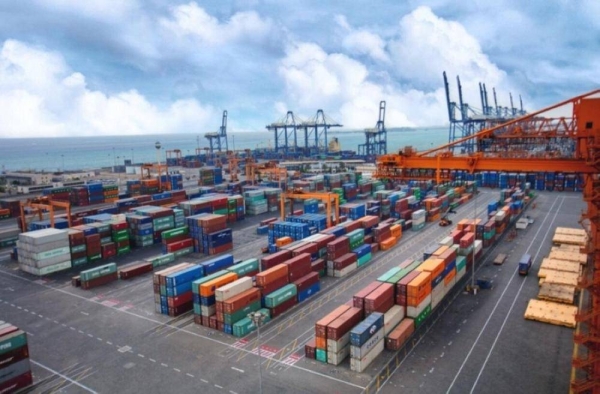The second quarter of 2024 saw a significant surplus in Saudi Arabia’s non-oil trade balance with Gulf Cooperation Council (GCC) countries, according to a report released by the General Authority for Statistics. The surplus reached SR6.776 billion, marking a 600% annual growth compared to the same period in 2023. Total non-oil commodity exports, including national exports and re-exports, amounted to SR24.392 billion, showing a 31% annual growth. Meanwhile, total commodity imports stood at SR17.616 billion, as reported by the Saudi Press Agency (SPA).
Among non-oil commodity exports to GCC countries, the United Arab Emirates (UAE) ranked first with exports valued at SR15.070 billion, accounting for approximately 61.8% of the total. Bahrain followed with exports valued at SR5.792 billion, representing 23.7% of the total. Kuwait secured third place with SR1.823 billion (7.5%), Oman ranked fourth with SR965 million (4%), and Qatar rounded out the top five with SR741 million, representing 3% of the total non-oil exports to the GCC.
This significant growth in non-oil trade with GCC countries reflects a positive trend in Saudi Arabia’s economic relations with its neighboring countries. The increase in exports signifies a strong demand for Saudi products and services in the region, indicating a favorable business environment for Saudi businesses looking to expand their market reach. The surplus in the non-oil trade balance also indicates a healthy trade relationship between Saudi Arabia and GCC countries, enhancing economic cooperation and mutual benefits.
The data from the Q2 international trade report highlights the important role of the GCC countries as key trading partners for Saudi Arabia. The strong economic ties between Saudi Arabia and the UAE, Bahrain, Kuwait, Oman, and Qatar are crucial for enhancing regional trade and promoting economic growth in the Gulf region. As Saudi Arabia continues to strengthen its economic diversification efforts, the non-oil trade sector with GCC countries plays a vital role in reducing dependency on oil revenues and promoting sustainable economic development.
The growth in non-oil commodity exports to GCC countries demonstrates Saudi Arabia’s commitment to diversifying its exports and expanding its presence in regional markets. By capitalizing on the strong demand for Saudi products and services in the Gulf region, Saudi businesses have the opportunity to increase their market share and drive economic growth. The surplus in the non-oil trade balance also indicates the effectiveness of Saudi Arabia’s trade policies and strategies in promoting trade with GCC countries and enhancing economic cooperation.
Overall, the significant surplus in the non-oil trade balance with GCC countries in the second quarter of 2024 reflects a positive outlook for Saudi Arabia’s trade relations with its neighboring countries. The growth in non-oil commodity exports to the UAE, Bahrain, Kuwait, Oman, and Qatar highlights the strong demand for Saudi products and services in the region, signaling a promising future for businesses looking to expand their market reach. With ongoing efforts to strengthen economic ties and promote trade cooperation, Saudi Arabia is well-positioned to further enhance its economic relations with GCC countries and drive sustainable growth in the region.































